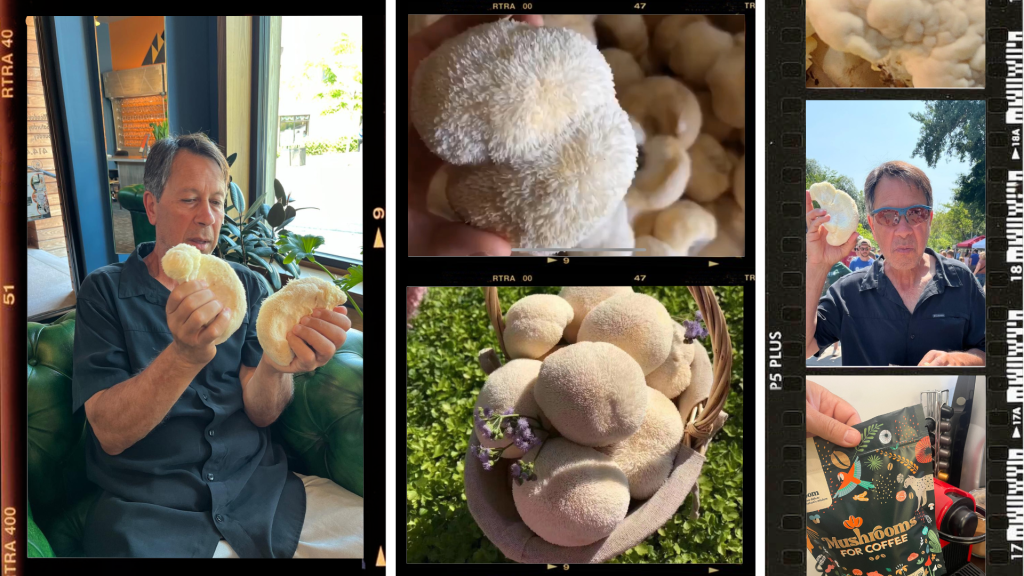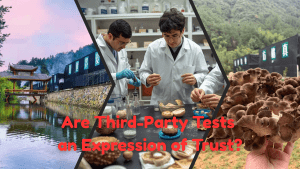Lion’s Mane (Hericium erinaceus) is one of nature’s most intriguing medicinal mushrooms. When I first encountered it, I was captivated by its unique, shaggy appearance—resembling a lion’s mane—and its reputation for supporting cognitive health and nerve repair. Diving deeper into the science behind this mushroom, I discovered a world of evidence that bridges ancient traditions with modern research. Let me take you on this journey to understand how Lion’s Mane could have the potential for natural brain support/
Active Ingredients in Lion’s Mane
Lion’s Mane’s medicinal properties come from two powerhouse compounds:
- Hericenones (found in the fruiting body) stimulate the Nerve Growth Factor (NGF) synthesis, a protein vital for maintaining neurons.
- Erinacines (found in the mycelium): Small, bioactive molecules crossing the blood-brain barrier, enhancing NGF production and neurogenesis.
These compounds can support neural function.
This duo is a potential natural support for cognitive and neurological health.
Mechanisms of Action
1. Stimulation of Nerve Growth Factor (NGF)
NGF is a protein essential for neuron growth, maintenance, and repair. It’s also key to neuroplasticity—the brain’s ability to adapt, reorganize, and form new connections. By promoting NGF synthesis, Lion’s Mane contributes to:
- Neurite Outgrowth: Enhanced growth of axons and dendrites, improving neuron communication.
- Neuroprotection: Shielding neurons from oxidative stress, inflammation, and toxins.
2. Neurogenesis and Neural Repair
Erinacines in Lion’s Mane encourage the regeneration of damaged neurons and the formation of new ones. This is especially valuable for:
- Supporting Brain Recovery: Aiding neural repair.
- Counteracting Age-Related Decline: Slowing cognitive impairments.
3. Anti-inflammatory and Antioxidant Effects
Chronic oxidative stress significantly contributes to neurodegenerative diseases. Lion’s Mane addresses these challenges by:
- Potentially Reducing Pro-Inflammatory Cytokines: Suppressing brain tissue inflammation.
- Neutralizing Free Radicals: Protecting neurons from oxidative damage.
Improved Cognitive Function
One of the most compelling studies on Lion’s Mane was published in the Journal of Phytotherapy Research. This double-masked, placebo-controlled trial assessed the effects of Lion’s Mane on individuals with mild cognitive impairment. After 16 weeks, participants taking Lion’s Mane showed marked improvements in cognitive function compared to the placebo group. However, the benefits diminished once supplementation stopped, emphasizing the need for consistent use.
Support for Neurodegenerative Disorders
Preclinical studies suggest Lion’s Mane may help mitigate the effects of neurodegenerative diseases by:
- Reducing Amyloid-Beta Plaques
- Improving Motor Function: Animal studies show enhanced neural regeneration.
Nerve Regeneration
Animal research highlights Lion’s Mane’s ability to accelerate peripheral nerve recovery after injury, making it a potential natural neuropathological support.
Bridging Tradition and Science
Lion’s Mane is a prime example of how ancient remedies can align with modern science. Its bioactive compounds, hericenones, and erinacines, have potential support for cognitive enhancement and neural repair.
Here are some key studies about the lion’s Mane mushroom’s potential:
- Sarah Docherty 2023 The Acute and Chronic Effects of Lion’s Mane Mushroom Supplementation on Cognitive Function, Stress and Mood in Young Adults: A Double-Blind, Parallel Groups, Pilot Study
- Mori et 2009: A clinical trial showing significant cognitive improvements in elderly participants with mild cognitive impairment after Lion’s Mane supplementation.
- Sze Chun Chau 2023 Hericium erinaceus Promotes Anti-Inflammatory Effects and Regulation of Metabolites in an Animal Model of Cerebellar Ataxia
- Wong Kah Hui 2012 Neuroregenerative Potential of Lion’s Mane Mushroom, Hericium erinaceus (Bull.: Fr.) Pers. (Higher Basidiomycetes), in the Treatment of Peripheral Nerve Injury (Review)
- Kim et 2014: Found that Lion’s Mane extracts improved motor recovery and reduced neuronal damage in Parkinson’s disease models.
- Izabela Szućko-Kociuba 2023 Neurotrophic and Neuroprotective Effects of Hericium erinaceus
- Kah-Hui Wong 2012 neuro regenerative potential of lion’s mane mushroom, Hericium erinaceus (Bull.: Fr.) Pers. (higher Basidiomycetes), in the treatment of peripheral nerve injury (review)











